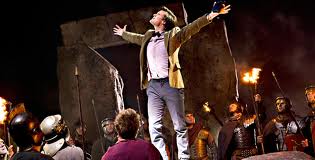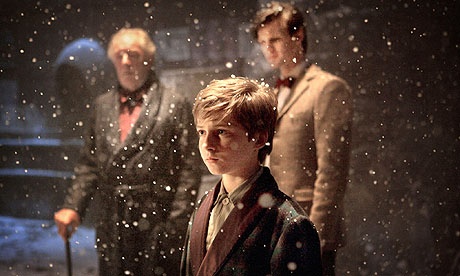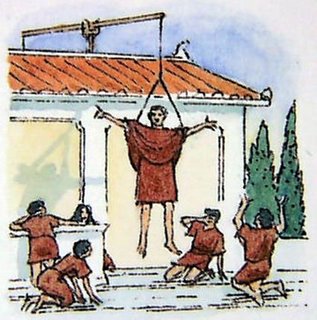Deus Ex Machinas and The Doctor
 The Doctor breaks rules. That’s been the case especially in the revived series (2005 – present) of the British television programme Doctor Who. And both head writers, Russell T. Davis (until late 2009) and Steven Moffatt, also seem to break plenty of “rules.” Web-search this: Doctor Who, deus ex machina, to see frequent complaints about supposed hat-trick story endings:
The Doctor breaks rules. That’s been the case especially in the revived series (2005 – present) of the British television programme Doctor Who. And both head writers, Russell T. Davis (until late 2009) and Steven Moffatt, also seem to break plenty of “rules.” Web-search this: Doctor Who, deus ex machina, to see frequent complaints about supposed hat-trick story endings:
Doctor Who, “The Parting Of The Ways.” Almost every season of Russell T. Davies’ Doctor Who series has ended with some kind of unlikely miracle fix, but the first one was by far the hardest to swallow. — i09.com, “The 5 Types of Scifi Deus ex Machinas”
Just be careful not to drop and break [your sonic screwdriver], Matt Smith, because, without it, you really only have deus ex machina on your side. — ROFLRazzi.com
“On planet Earth it’s generally taken for granted that it’s a bad thing to introduce into a narrative some last-minute solution that was totally unexpected and unheralded … The unexpected, unadvertised solution which kisses it all better is known as a deus ex machina – literally, a god from the machine. And a god from the machine is what the Doctor now is.” — Terry Pratchet, author of Discworld (Guardian.co.uk, May 4, 2010)
But I’ll argue here that a deus ex machina — a surprise twist at the last second to save one’s characters or story — need not always be wrong, for at least four reasons.
Quick catchup: Doctor Who follows the adventures of a time-and-space-traveling Time Lord from an ancient race. Frequently he befriends someone from Earth, usually a young woman, and goes gallivanting about to save cities, people, worlds, and jolly often the entire universe.
As of today, his most recent adventure was Doctor Who: A Christmas Carol, which was not a direct ripoff of that story; instead, it only shared a starter premise, then gaily strode in other directions. The Doctor’s friends are stuck in a spaceship plummeting toward a planet, minutes away from being torn to shreds in its turbulent atmosphere. So the Doctor drops into the life of planet ruler Kazran Sardick (Michael Gambon — Dumbledore!), the only man who can adjust the planet’s atmosphere to allow the ship to land safely. Sardick, however, is the story’s Scrooge equivalent, whose heart the Doctor must change to save the day.
That was a story summary you could get anywhere; now for the spoiler-laden paragraphs.
Inspired by Dickens, the Doctor uses his fantastic timeship, the TARDIS, to play a ghost of Christmas past. He actually drops into Sardick’s life as a child, rewriting time itself, and the adult Sardick’s memories even as the old man views videos of what happened. That seems to be working — until a complication that turns the teenaged Sardick against the Doctor’s visits.
After trying a present reminder of the ship’s victims, the Doctor finally tries his final effort.
The Doctor: I’m not finished with you yet. You’ve seen the past, present. And now you need to see the future.
Sardick: Fine. Do it. Show me! I’ll die cold, alone and afraid. Of course I will. We all do. What difference does showing me make? Do you know why I’m going to let those people die? I don’t get anything from it. It’s just that I don’t care. I’m not like you. I don’t even want to be like you. I don’t and never ever will care.
The Doctor: And I don’t believe that.
Sardick: Then show me the future. Prove me wrong.
The Doctor: I am showing you the future. I’m showing you right now.
(As the camera slowly moves the Doctor steps to the side, revealing Sardick himself as a child, standing beside the Doctor and gazing in shock at his older self. The older Sardick stares back, horrified.)
The Doctor: So what do you think? Is this who you want to become, Kazran?
Young Kazran Sardick: Dad?
 End spoiler paragraphs and quotes. Is that a cheat ending, a wrongful deus ex machina? Not at all — and not just because I get choked up even now, picturing the scene in my mind. It’s not a cheat because of DEM Reason 1: It fits perfectly with the story’s established rules. For Doctor Who and this story in particular, it’s also a kind of twisted genius because it’s almost exactly what you’d expect a professional storyteller not to do: something so “expected” as to simply have a character rewrite time itself. But if you’re the Doctor, you can do that.
End spoiler paragraphs and quotes. Is that a cheat ending, a wrongful deus ex machina? Not at all — and not just because I get choked up even now, picturing the scene in my mind. It’s not a cheat because of DEM Reason 1: It fits perfectly with the story’s established rules. For Doctor Who and this story in particular, it’s also a kind of twisted genius because it’s almost exactly what you’d expect a professional storyteller not to do: something so “expected” as to simply have a character rewrite time itself. But if you’re the Doctor, you can do that.

"Temporal energy. Same screwdriver at different points in its own time stream."
Another quick spoiler: thus it’s also a perfectly acceptable, genius-almost-because-it’s-not method for the Doctor to escape an absolutely inescapable-from-the-inside prison box, as in last year’s series 5 finale The Big Bang. He simply came back from the future to give a friend his sonic screwdriver, after which the friend headed to the box and unlocked it from the outside — revealing the past Doctor inside, still holding his screwdriver (touching the two screwdrivers generates an energy spark). All the Doctor needed to do was make sure to remember, in the future, to go back in time and give his friend the sonic screwdriver to free himself. Paradox!
DEM Reason 2: It works if a story’s author is wise about setting a story’s rules and their limits, and following them consistently. As a Time Lord, who can jump to almost any point in time and space, and even change some history, why couldn’t the Doctor simply rewrite a man’s life? Or:
The Doctor: Oh, I won’t bother calling your servants. They quit. Apparently they won the lottery at exactly the same time. Which is a bit lucky when you think about it.
Sardick: There isn’t a lottery!
The Doctor: As I say — lucky.
DEM Reason 3: We already expect a good story to end with our favorite characters winning. The only real surprise is how that conclusion comes about — the surprises and story twists that happen along the way. But no one watches a film or TV program (or programme), or reads a book, then sneers in annoyance at the end simply because things turned out all right.
 Yet DEM Reason 4 is similar to the reason old plays brought up a “god out of the machine,” and even better because Christians know and believe a real God is already involved in our true world’s story. God Himself has promised to carry out the ultimate “deus ex machina” at the end of the universe’s present age. Those who know and love Him also already know the ending, and yet we still struggle with the difficulties of life, eh wot? No one who loves God accuses Him of cheating. (And we also don’t stop arguing about exactly how that ending will play out; watch for this to pick up thanks not only to the 2012 myths, but China’s rise to world power.)
Yet DEM Reason 4 is similar to the reason old plays brought up a “god out of the machine,” and even better because Christians know and believe a real God is already involved in our true world’s story. God Himself has promised to carry out the ultimate “deus ex machina” at the end of the universe’s present age. Those who know and love Him also already know the ending, and yet we still struggle with the difficulties of life, eh wot? No one who loves God accuses Him of cheating. (And we also don’t stop arguing about exactly how that ending will play out; watch for this to pick up thanks not only to the 2012 myths, but China’s rise to world power.)
God has already established the real story’s rules. But until that expected end — about which we don’t know exactly what will happen anyway — He is playing out an even greater story. And that story is not because He expects us to pretend we don’t know if the ending will be happy, but so He can show us even more what a wise and amazing Author He is.











































[…] This post was mentioned on Twitter by E. Stephen Burnett, Speculative Faith. Speculative Faith said: Does "Doctor Who" wrongly use "deus ex machina" endings? Not if a story has its reasons. On #SpecFaith: http://bit.ly/gA5ipP […]
“You can’t rewrite history, not one line!” -William Hartnel as the first Doctor
And of course, Hartnell DID re-write history. But that’s another story. 😀
The issues is that this not by definition a Deus ex machina. The definition of a Deus ex machina is when something that has nothing to do with the story is presented to save the characters. In almost all cases, the story elements that present the resolution to the adventure are introduced early on. By definition, therefore, it is NOT a DEM. I think that RTD has many probs as a writer, but this was not one of them, to be sure.
I only mentioned the Hartnel quote because of the irony laying behind it. Just to hijack the conversation yet once again, the whole subject of being able to tinker with the causal nexus was dealt with in a beautiful fashion in Fritz Leiber’s short story, “Try and Change the Past,” in which a time agent discovers the time and method of his own death in the future. With each attempt to stop his demise through use of time travel, his future self still dies at that time, thought the method changes, in order that the causal chain remain unbroken. Leiber does the same sort of genius time traveling fiction in his Hugo Award winning book “The Big Time.” Now that I’m done with the book plug, and the thread hijacking, lets get back to Deus ex machina…
Sigh . . I miss the Doctor. I wish he’d come back to the US. Sigh. . .
Kim, have you heard about the new season? The two-part opener is set in Utah.
That’s a good point–DEM have no basis in the story: opening the Time Vortex or paradox loops do have their place in the Whoniverse.
Another good example is Return of the King. The Eagles show up even before they rescue Frodo and Sam–even more so if you include The Silmarillion references. It’s not a DEM because that’s what Manwe summoned them for!